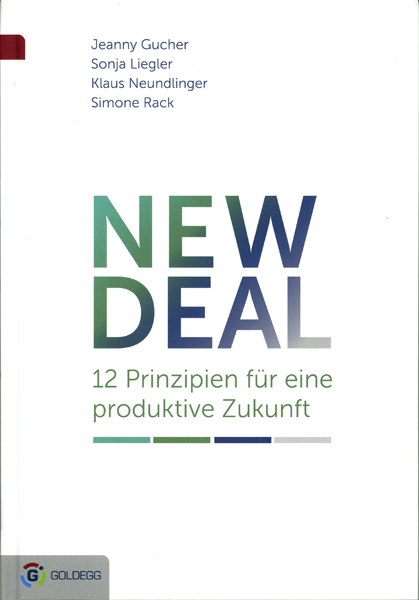This blog introduces a sociological approach to consulting to organizations, with a focus on social capital (Sozialkapital) as the indispensable foundation of value creation and social productivity. The approach, called New Deal, formulated in German (Gucher et al, 2015), is the fruit of new social science research, and is sponsored by Four Dimensions GmbH active in Vienna and Salzburg, Austria. New Deal represents a sociological approach in the sense that it sees work and value creation as a process by which social capital is constantly created as well as potentially destroyed in human interactions. To substantiate this insight New Deal introduces four "new economies" (not found in classical economy): of personal relationships, emotions, attention, and knowledge, respectively. According to this approach, managing the creation of social capital amounts to managing the four economies at all levels of an organization, whether it is hierarchical or not. The blog highlights what is fresh about New Deal in light of North American preferences for focusing on "getting the job done", or remaining in what CDF calls the "Task House". Reflecting on the New Deal approach from an adult-developmental perspective, the blog elucidates why "moving out of the Task House" is a requirement especially... Read More...
Category: Socio-emotional Dimension
Transforming the ‘Human Resources’ Function into the Core of Humanistic Management: Potentials, Requirements and Obstacles
The topic of this abstract for a lengthy article is presently absent from the literature of 'humanistic management' (M. Minghetti 2014), namely, the limitations of human collaborative intelligence that naturally arise from the vicissitudes of adult development over the lifespan. (For example, at level 2 of meaning making (Kegan 1982), especially when accompanied by undeveloped resources for complex thinking (Laske 2008, 2017), levels of collaborative intelligence that can actually be reached are very low indeed.) Limitations of collaborative intelligence pervade every culture, not only of organizations. They define to what degree an organization has the potential to become effectively developmental, thus able of self-transformation. Such limitations, uncovered by empirical research since 1975, naturally arise from differences in emotional and cognitive maturity that distinguish individual collaborators one from the other. Although they are no longer a mystery for researchers, these limitations continue to be disregarded by those who formulate visions of humanistic management, a fact that diminishes the realism of such visions. Transforming the Human Resources Function Read More...
A Developmental Systems-Constellation Workshop for Advancing Shared Leadership in Holacratic Environments
Shared or distributed leadership in holacratic environments is often more of a hope or an advertisement than a reality. This is so because leadership is an adult-developmental issue that behavioral training methods are not equipped to handle. However, tools originating in adult-developmental research (since 1975) are still unknown or else eschewed in behaviorally thinking companies, to their own detriment. This article describes the purpose, structure, goal, and outcomes of a workshop based on the Constructive Developmental Framework (CDF). It is an initial offering for preparing a company for undertaking a series of advanced team work sessions. Parties interested in evidence-based deliberately developmental approaches to leadership are invited to contact otto@interdevelopmentals.org. Proposal for systemic constellation work Read More...
A methodology for creating a developmentally aware society
Until quite recently, the notion that adults develop over their entire lifetime has been a well kept academic secret. It still is. Attempts at establishing “deliberately developmental organizations” (DDO’s; Kegan & Lahey 2016), based on 40 years of research in adult development, are quite recent. This article introduces to the Constructive Developmental Framework (CDF), a synthesis of adult-developmental research since 1975 that has been taught as well as practiced at the Interdevelopmental Institute since 2000 (). CDF is a new tool for understanding how people experience life and work, mostly without full consciousness. This qualitative understanding emerges from semi-structured 1-hour interviews which shed new light on how people construct their workplace internally, both individually and in teams. CDFs main strength in business lies in providing new tools for boosting, through dialog, two human capabilities: making meaning of experiences (called “social-emotional”) and making sense of the real world conceptually (referred to as “cognitive”), as further explained below. Viewed more broadly, CDF comprises a political dimension as well. It is a framework for coaching for society, in the sense of developing self-authoring citizens who can think independently, rather than in dependence on internalized or external others. At the present time, where algorithms... Read More...
What Everybody is Losing Out On by Bypassing 40 Years of Research on Adult Development
There is a vast lack of knowledge about how one's own level and phase of development as an adult uncanningly and forcefully causes the kind of suffering one feels most keenly. This short article is meant as a pointer to what is missing in all of the "helping" literature and the well-meant helping activities in a society which continues to be characterized by master-slave relationships in a multitude of forms. What is everybody losing out on Read More...
Einladung an deutsche Berater und Coach ihre berufliche Praxis höherzuschrauben
Warum nicht mit alten Vorurteilen brechen die aus der positivistischen Tradition stammen und alle im Flachland landen? Dazu ist im Zeitalter des distributed leadership mehr Anlass als je. Die alten Kompetenzschablonen sind tot, und nun wie weiter? Vielleicht hülfe es, sich zu erinnern dass Menschen sich ihr ganzes Leben lang entwickeln? Das würde auf die Erwahcsenenforschungen führen, die in diesem Buch von Otto Laske (übersetzt von Rainer v. Leoprechting 2010) dazu verwandt werden, neue Einsichten und Werkzeuge in die Weisen des Umgangs mit ‘human resources’ einzuführen. Das Buch zeigt die Stufen der lebenslangen Entwicklung der persönlichen Erfahrungen, die jeder in seiner Arbeit und seinem Leben macht, und die zu stets grösserer innerer Freiheit und Selbständigkeit führen. Das Buch gibt dazu neue Werkzeuge an die Hand und zeigt auch, wie man über die Verwandlung der Arbeit durch neue, z. B. holakratische Umgebunglen, nachdenken sollte. Humanpotenziale erkennen, wecken, und messen: Pay Pal Dazu Weiteres auf: Gateway auf deutsch Read More...
